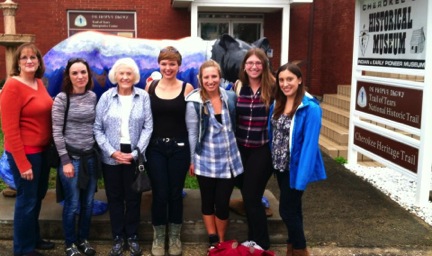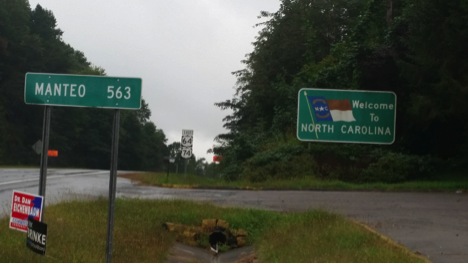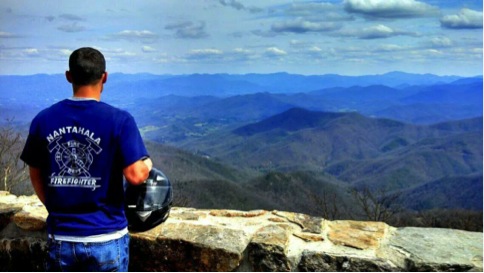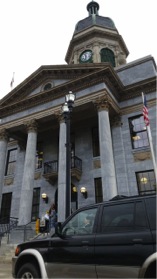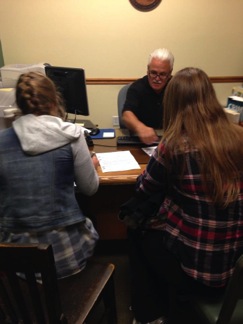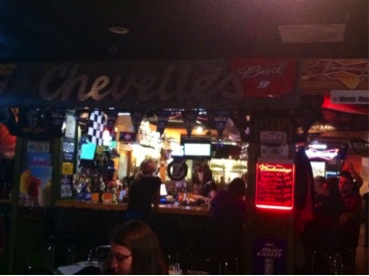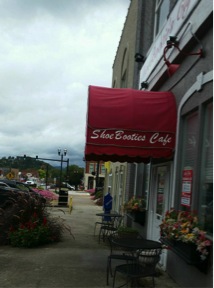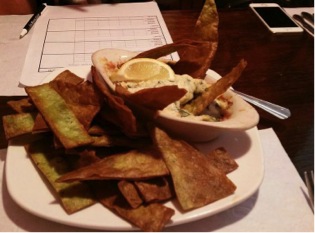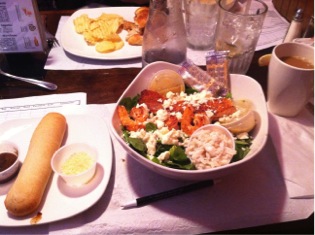By Hillary Dooley and Nicole Esplin, 2013
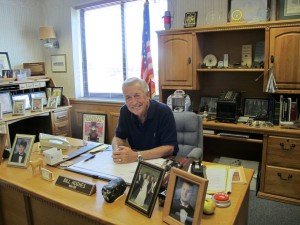 There’s something about Bill Hughes. Something that makes you want to tell his story.
There’s something about Bill Hughes. Something that makes you want to tell his story.
Traveling gets a person used to meeting new personalities every day, as we search for a new story to entice readers to read our bylines. But with Bill, there was something more about him. Something that you can’t plan to find readily. Bill Hughes is a modern-day living legend; the kind of man that will never die in Murphy. He’s the kind of man you can imagine enshrined as a statue, casting his brass gaze over Main Street. Bill’s a man whose impact will be around long after he passes from his beloved town- his self-proclaimed goal. “The town of Murphy had been good to me,” Mayor Bill Hughes said. “It has allowed me to be moderately prosperous. I was thinking of ways that I might pay it back.”
Hughes was born in Murphy, N.C. in 1938, and grew up with his mother and grandfather, who worked on the L&N Railroad. Hughes’ first fond memories of Murphy lead back to the L&N railroad depot. One of his most memorable experiences happened when he was 6 years old. Inspired by the new story of the American Hobo, he climbed onto an L&N Railroad boxcar and headed for Atlanta. “I was just a wanderlust boy,” Hughes said. “I rushed and jumped onto the boxcar. When the train stopped and I got out, I thought we were in Atlanta.” What Billy Hughes thought was Atlanta turned out to be Culberson- the next stop over from Murphy. Billy was soon spotted by a man who worked with his grandfather, and was promptly taken home. “My grandfather was called and I still remember him coming in his 1937 Chevy to the depot,” Hughes said. “That was the longest ride home of my life.”
The L&N depot in Murphy closed down in 1974, and Hughes has been working to get the railroad reinstated. His passion for the industry is apparent in his cluttered office, filled with historic railroad mechanisms. “We’ve got switch locks, we’ve got telegraph tees, we’ve got this adding machine, and my grandfather had this first computer right here, which he bought used in 1911.” Hughes pulled a few more trinkets out from the bookshelf behind his leather desk chair and carefully brought them over for our benefit. As Hughes explained crossties, switch locks, ½ fare punches and date nails, I couldn’t help but let my eyes drift from the items to Hughes’ face. None of this railroad memorabilia was new to Hughes, but his face was filled with nostalgia and awe. We imagined that Hughes had been making the same awe-struck, excited expression since he was introduced to these objects as a boy down at the depot.
Bill continued on the long story of his life in Murphy, punctuated with milestones and his favorite memories. Bill’s face lit up as he recalled the first time he met his wife of 53 years. “When I married Barbara, she was majorette, main cheerleader, voted most attractive in the senior class, homecoming queen and the prettiest girl in town,” Bill said. Bill laughed and continued, “I don’t know yet how I swiped her; I guess it was my irresistible charm and intelligence.” Everyone listening laughed with Bill and smiled as Barbara, sitting next to Bill, blushed. “Bill is three years older than I am, so I didn’t know him at first,” Barbara said. “We met outside the drug store.”
As Bill continued describing his high school years in a typical small town during the 1950’s, we felt the real-world slip away and imagined walking down the street to the old Henn theatre, where Bill worked as a teenager. “The days of the ’55 and ‘56 Chevys, the ’57 Plymoths and Pontiacs. In the afternoon, all the kids went to Parkers drug store. You’d hang around at the drug store, play records and we would drink Cokes and so on like that. Occasionally, you’d do a little dancing and some sort,” Hughes said. “That’s it. You cruise up and down the street. If you get a date you know you cruise; we had drive-ins where you drive up, they put the creole on, all that. A kind of life that’s gone now, but it was a lot of fun while it was happening.” We closed our eyes and imagined a life with no cell phones, no last minute plans to meet after school, and an assured trust on a Friday that everyone would be at the drugstore to celebrate the end of the week.
“At night, we’d pull our cars in, we’d hang out there, we’d turn one of the car radios on to WLAC Nashville, and we’d listen to John Richburg‘s Rock ‘N Roll Show all night long,” Hughes said. “He’d play Little Richard, Fatts Domino, the Cadillacs. We’d sit there and listen to the radio and there was a never-ending debate about which car was the best. I’ve seen kids almost come to blows about which car was the best, but that was the ‘50s. And it was a great time to be a kid. Some of the fondest memories go back there.” After Bill graduated in 1956, the majority of his class left Murphy while he stayed behind to attend college in order to become a teacher. Bill became a teacher when he was 20 years old, and taught 6th and 7th graders at the White Church Elementary School seven miles down the road from Murphy. When the position of principal was vacated, Bill submitted himself for consideration.
“When I applied to the job I got it and I was 25 years old,” Hughes said. “I was the youngest principal in the state for the size of the school. I loved the job, we got right into it, I made a lot of friends. The people in the community, knew me, and they trusted me.” Bill’s accomplishments in his 33 years as principal reach beyond those of his predecessors; his school system was the first in the county’s history to receive state accreditation, and he organized the first Pre-K and Kindergarten classes in the county. Hughes also developed a mold for the beginning three years of primary school- teachers attend to children more individually for these years by allowing the children to dictate the pace of their education. This program still exists at the school.
Bill attributes much of his success as principal to the teachers he worked with. “When I walked in to school the first day, the staff came in. I spotted 6 teachers who had taught me in the grades,” Hughes said. “They were working for me, but I realized that was not going to work; I was still going to be working for them, because I wasn’t Mr. Hughes, I was still Billy. They just simply took me under their wing and I attribute my success there because they took care of me the first 5 years I was principal, just like I was one of their students.” Bill’s career as a principal continued for 33 years until he retired in 1997. After working as police commissioner on Murphy’s town council for 10 years, Bill decided it was time to completely repay his town. It was no surprise when Bill was elected mayor; nor has it been during each of his four reelections. “I’m full-time mayor,” Bill said. “I’m here all the time. I get here at 8 o’clock, I leave at 5. I’ve always had what I call an open door policy. That door you see there stays open all the time. You don’t need an appointment to see me, you just walk in.”
Bill oversees all of the town’s departments, including the library, the fire and police forces, and the water works. He credits Murphy’s continued success to the collaboration the town council members and volunteers who came together to make Murphy a town that is like no other and a town that provides for its citizens. Bill’s smile became bigger as he began to describe the talent of the citizens in Murphy. “Whether it be jewelry making, wood working, anything along that line; weaving, cloth, the whole bit- you name it. Painting of all kinds, watercolor, it gave all of these folks an opportunity to come out and to present their wears on this occasion. And we found there was a tremendous amount of talent and a big art colony here that just had not had an opportunity to be exposed, and it is now, and it’s really, really fantastic, some of the talents we have here.” Every Friday night these talents are on display at the Art Walk, an event that has replaced drive-Ins and “cruising” for Bill and Barbara. On Saturday morning, instead of sleeping in after a night on the town, Bill and Barbara walk down to the Farmers Market in downtown Murphy.
The town is currently working on developing a 10-mile mountain bicycle trail and improving its Riverwalk trail, which Bill feels strengthens the feeling of serenity and awe in Murphy. He says, “You know, water has a tranquil effect on people, and as you walk along, especially in the fall, and you can see the reflection of colors into the water, it’s almost spiritual.” He pointed to his desk and as he picked up stack after stack of paper it became clear that the 75-year old mayor still has plans for Murphy to preserve the magic of Murphy and ensure that its citizens prosper. Bill has a 10 year plan for every aspect of city operation, explaining that “you’ve gotta know where you’re going, you can’t be haphazard anymore.”
“I wanted to be of service,” Bill said. “I wanted to pay the debt back to the community. And when you walk away, if you can say you’re leaving more behind than you took with you, then you’ve accomplished that.” At the end of the day, Bill has led a life that has impacted the town and people of Murphy. With two successful daughters and a wife who works alongside him, Bill can look out across the town and know he’s left something behind. Driving home, Bill looks at the old oak trees lining his driveway. They grow together in an arch, and the sunlight shines through the branches. He says, “the spirits seem happy here.” If he’s right, it’s because they’re happy seeing Mayor Bill Hughes of Murphy returning home safe and sound.
